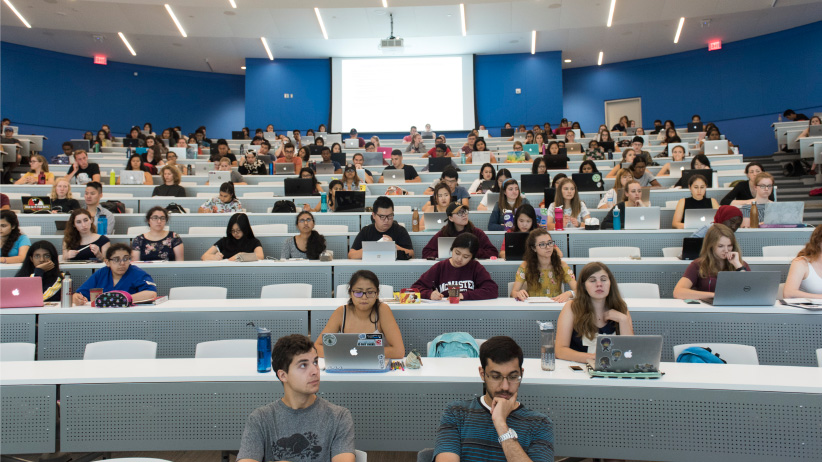McMaster’s engineering degree, served with a side of business savvy
Students learn everything from a standard engineering degree, plus economics, communications and more
Students sit in a lecture hall in L.R. Wilson Hall in McMaster University in Hamilton, Ontario on Thursday, September 22, 2017.
Share
[widgets_on_pages id=”university_guide_global_forever_header”]
[widgets_on_pages id=”university_guide_2018_intro_header”]

When planning their ways up the corporate ladder, many engineers decide to go back for an MBA midway through their career. But McMaster is building business savvy into their engineering undergrad program, giving graduates a professional edge right from the start.
In the five-year program, students learn everything they would in a standard four-year engineering degree—which McMaster also offers—plus 15 more courses in business, three in economics and additional courses on subjects ranging from communications skills to innovation, creativity and project management. Students have the option to do co-op placements throughout their studies, and they conclude the program with a mandatory industry project, which they do in partnership with a company in the area. “They graduate really employment-ready,” says Baba Vishwanath, a professor of management and instructor at McMaster.
Students apply to the program after their first year, and go against stiff competition. Only 50 to 60 per cent of those who apply get accepted—a selection process that’s based mainly on GPA. The program, which Vishwanath describes as “the granddaddy of all engineering management programs in this country”—has churned out success stories since its inception in the ’70s. Stephen Elop, the former Nokia CEO, is among its many graduates who’ve risen to the ranks of top executives.
MORE ABOUT ENGINEERING:
- How engineers are engineering change on the gender gap
- Global warming makes ice forecasting a hot field
- Why do so many jihadis have engineering degrees?
- Top 10 Engineering Universities
- Why don’t future engineers learn real-world skills in school?
- Starting engineering school? Aim for 80-plus.
- Health, engineering degrees have best return: Workopolis
- McMaster engineers angry over alcohol ban
[widgets_on_pages id=”university_guide_2018_outro_footer”]